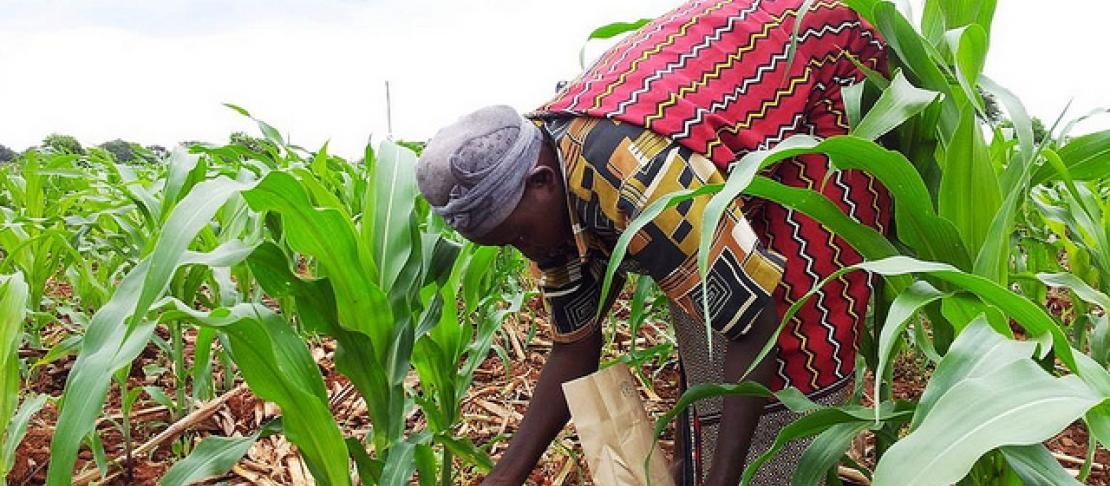Mainstreaming climate-smart agriculture at the sub-national level in Ghana

Agricultural extension officers in Ghana receive training on climate-smart agriculture; district-level platforms set to help spread knowledge to farmers.
It’s often difficult for farmers to know the right kind of fertilizers to apply and at what rate to use them on their fields. A recent training workshop held by the West African Agricultural Productivity Programme (WAAPP) Ghana and the Ghana Climate Change, Agriculture and Food Security Platform helped promote the benefits of soil testing for enhanced nutrient use efficiency. The two-day training workshop in the Ashanti Regional Capital of Kumasi on 7 and 8 April 2016 brought together 24 district agricultural extension officers. The participants were drawn from six administrative regions, namely: Greater Accra, Central, Ashanti, Eastern, Western, and the Volta Regions. Ten districts, including Birim South, Tain, Ada West, Busume Fretuo, Ga West, Abura Asebu Kwamankesi, Agona East, Joabosu, Akasti South, and Ho West, represented the six regions.
Training approach and content
Within the context of climate-smart agriculture (CSA), the agricultural extension agents (AEAs) and their field supervisors were trained on benefits of soil testing using simple and qualitative soil testing kits for the determination of soil nitrogen, phosphorus, potassium, and pH levels.
Participants were also taken through a checklist for setting up and managing field demonstrations as learning sites for CSA. As part of the training approach, AEAs were guided in various sessions to discover CSA practices including climate forecasting and advisories development through the Participatory Scenarios Planning (PSP) process. The sessions were participatory and interactive as participants shared views and experiences freely.
AEAs learning about CSA
In general the interactive process revealed that all (100%) of the participants were well aware of climate change, and 78% of them conducted farmer awareness creation through sensitization before the training. The statistics further revealed that 50% of the participants were now learning about the CCAFS Science-Policy dialogue platform and CSA for the first time in the training workshop. This national level innovative platform was presented to the participants with the proposal to downscale the process at the sub-national level as a vehicle to execute the CSA agenda within districts for sustainable agricultural production. The portion of participants, which may be termed as “smart front liners” that had knowledge of CSA prior to the training were found to have done sensitization meetings with farmers ranging from 60 to 600 participants. Some of the CSA practices farmers were encouraged to take up in their farm systems included slash and no burn, tree planting, ridging along the contours, leaving trees on farms (4 trees/ha), cover cropping, etc.
District level CSA platforms to develop climate advisories
At the close of the training, the 10 districts were each supplied with a complete set of the soil testing kits for their practical work in soil fertility management at farm level. The participants also developed climate advisories for their respective zones to encourage farmer engagement for the coming season based on the April – October seasonal forecast for 2016 by the Ghana Meteorological Agency. The participants, trainers, and facilitators were all in agreement that district level CSA platforms should adopt the practice of Participatory Scenarios Planning and advisories development at the beginning of each year in order to consistently enable the AEAs to more effectively engage with farmers and enhance farmer adaptive capacities and sustained productive livelihoods through diversification.
Key messages:
- The mainstreaming of climate-smart agriculture into agricultural development interventions, programmes, and institutions provides clear opportunities for increased productivity, incomes, and food security while sustaining environmental health.
- Building the capacities of agricultural extension agents and farmers on climate-smart agriculture at the district level is a policy option for joint learning and information sharing that is supportive of institutional growth for enhancing sustained decision making for CSA solutions. Actions on solutions by local actors will sustainably address progressive climate change effects and variability while building needed adaptive capacities.
Karbo Naaminong, Delali Nutsukpo and Kingsley Agyeman are members of the Ghana CCAFS Science - Policy dialogue platform, implementing a CCAFS Policies and Institutions project and promoting partnerships with the West African Agricultural Productivity Programme in Ghana. The story was edited by Laura Cramer (CCAFS Flagship on Policies and Institutions).



